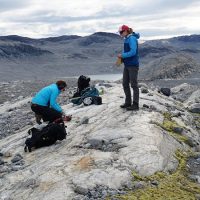The College of the Environment has numerous programs to continue in post-graduate studies. Check out our map of all College of the Environment units, both on and off campus.
Research degrees
Our students conduct cutting-edge research on all continents and in all oceans across the globe.

Aquatic and Fishery Sciences
M.S., Ph.D.
Description:
Understand aquatic natural systems, foster the sustainable use of resources, and develop solutions to a broad range of environmental issues.

Atmospheric Sciences
M.S., Ph.D.
Description:
Further the fundamental understanding of the physics and chemistry of the Earth’s atmosphere and consider problems critical for the welfare of modern society, like climate change, air pollution and extreme weather.

Earth and Space Sciences
M.S., Ph.D.
Description:
Further the understanding of Earth, the solar system and their histories through research that extends from the center of the Earth to the rim of the solar system.

Environmental and Forest Sciences
M.S., Ph.D.
Description:
Advance basic and applied research dedicated to the stewardship of natural and managed environments and the sustainable use of their products and services.
Description:
Create knowledge and understanding about the ocean through observation, theory, modeling and technological innovation with a particular focus on climate change, coastal processes and extreme environments.

Quantitative Ecology and Resource Management
M.S., Ph.D.
Description:
Apply quantitative tools to ecological and research management issues.
Dual-title research degrees
Description:
Combines knowledge and techniques from many fields, including astronomy, biology, chemistry, geology, atmospheric sciences, oceanography and aeronautical engineering to study life in the universe.
Professional degrees
Our students conduct cutting-edge research on all continents and in all oceans across the globe.

Earth and Space Sciences
Applied M.S.
Description:
Further the understanding of Earth, the solar system and their histories through research that extends from the center of the Earth to the rim of the solar system.

Environmental and Forest Sciences
M.F.R.
Description:
Advance basic and applied research dedicated to the stewardship of natural and managed environments and the sustainable use of their products and services.

Marine and Environmental Affairs
M.M.A.
Description:
Perform research at the intersection of natural and social sciences and public policy to address contemporary and emerging issues in marine systems, especially those associated with the human dimensions of global change.
Certificate programs
Augment your research degree with a specialized graduate certificate in astrobiology, climate, or data science.

Climate Science
Graduate Certificate
Description:
Combines interdisciplinary courses, specifically designed to address the cross-linkages in the earth system not found in disciplinary curricula, with a capstone in climate science communication.

Astrobiology
Graduate Certificate
Description:
Combines knowledge and techniques from many fields, including astronomy, biology, chemistry, geology, atmospheric sciences, oceanography and aeronautical engineering to study life in the universe.













